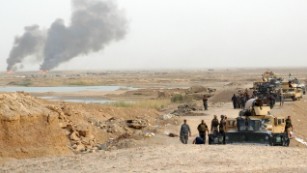Washington – Turkish President Recep Tayyip Erdogan has placed the Obama administration in a delicate position — stepping up his country’s involvement in the war on ISIS at precisely the moment he is making a power play to solidify his position as Turkey’s leader.
On Tuesday, the U.S. and Turkey announced they had finalized joint anti-ISIS air operations, cementing a recent agreement to work more closely to take on the terror group in neighboring Syria and Iraq.
The new agreement with the U.S. came just one day after Erdogan took the unprecedented political step of calling for yet another round of elections after his ruling Justice and Development Party (AKP) failed to form a coalition government despite earning a plurality of the vote held in June.
Many in the West see the newly called snap campaign as an attempt by Erdogan to increase his grip on power by seeking another election to secure his party a parliamentary majority rather than settle for a coalition government.
The confluence of events drives home the balance the Obama administration must strike between its goal of looking to promote democratic inclusiveness in Turkey and the Pentagon’s increasing reliance on Erdogan’s government for help battling ISIS.
In the months since the June election, Turkey has significantly increased its commitments to the anti-ISIS effort, allowing the U.S. to conduct air operations from its Incirlik military base and, with Tuesday’s announcement, joining the air campaign itself.
“The fact that Turkey is now going to be flying alongside with other coalition aircraft is a significant step forward, one we’ve been waiting for,” Pentagon spokesman Peter Cook said in welcoming the move.
The U.S. has long sought greater participation from Turkey in the effort to fight ISIS, in part because Incirlik is a much more convenient for U.S. sorties into Syria than the other existing options and also because Turkey’s border with Syria has been a key transit point for foreign fighters seeking to join up with ISIS and the U.S. would like to see a greater clampdown.
Indeed, Cook said that cooperation with Turkey “remains a work in progress,” but he also stressed that, “We believe that Turkey is committed” to the anti-ISIS mission.
Part of the difference between the U.S. and Turkish approaches to ISIS is a result of their divergent goals in the region.
While Washington has the eradication of ISIS as a top priority, Ankara is at least as concerned about the PKK, a Kurdish group that has launched frequent attacks on Turkey and has positions in Syria and Iraq.
In fact, some Western analysts see Erdogan’s increase in support for the U.S.-led anti-ISIS coalition as an extension of his political maneuvering.
The campaign against ISIS, along with recent actions against the Kurdish PKK, are “part and parcel,” of Erdogan’s election efforts, said Soner Cagaptay, Director of the Turkish Research Program at the Washington Institute for Near East Policy, as Erdogan seeks to promote nationalist sentiment to re-solidify his party’s appeal.
“Erdogan never wanted a coalition government,” Cagaptay added.
And a key reason the AKP needed to enter a coalition after the June 7 vote was an unprecedented alliance between secular Turks and Kurds in support of the new pro-Kurdish People’s Democratic Party, which surpassed the 10% vote threshold for parliamentary representation and helped deny AKP a majority.
“This has kind of thrown a monkey wrench in President Erdogan’s presidential ambitions,” Cagaptay noted.
But new elections, expected to take place Nov. 1, could help Erdogan get around that.
Since the June contest, Turkey and the PKK have been involved in several deadly attacks and retaliations. Heightened anti-Kurdish sentiment in Turkey could both help more voters turn out for the AKP in November and peal away Turkish votes from the new pro-Kurdish party.
The concern in Washington is that Erdogan is finding ways to link the PKK to moderate Kurds and the pro-Kurdish parties as part of the anti-ISIS campaign in order to alienate the latter, as well as liberal Turks who have joined with the moderate Kurds.

U.S. officials do not believe the AKP has the votes to dramatically change their vote share in the November elections, but there are concerns about broader trends in Turkey, which have led to a narrowing of political space through restrictions on media freedoms and social media access.
In addition, Erdogan has been hoping to muster enough votes to change Turkey’s constitution to increase his own authority, which as president is muted by Turkey’s current parliamentary system.
The AKP has also adopted many policies that are less friendly to the U.S. and close allies such as Israel since replacing the secular governing party 13 years ago — throughout which time it’s enjoyed a parliamentary majority.
Critics in Turkey argue that Erdogan’s latest moves are part of this larger pattern toward less democratic openness.
“We’re watching this just like we watch political developments in other places around the world,” State Department Spokesman John Kirby told reporters Monday, after the call for new elections. “I think our stance, again, around the world, for inclusiveness and representative government, fair and free, credible elections, is iron-clad.”
But Kirby would not go so far as to weigh in on the announcement of new elections, calling these “internal political issues.”
And Kirby also recalled the assistance that Turkey is providing the U.S. in the Middle East.
“Turkey is an ally and a partner,” he said, “and we’re going to continue to work with whatever Turkish government is in place.”
“They continue to contribute, and we continue to be grateful for those contributions,” said Kirby.
As reported by CNN
